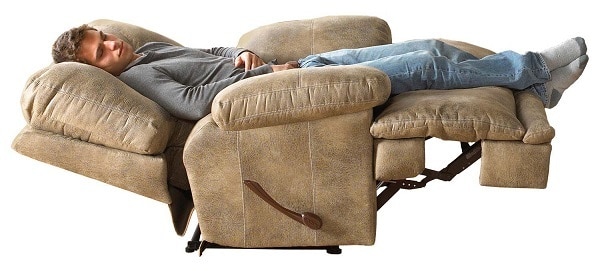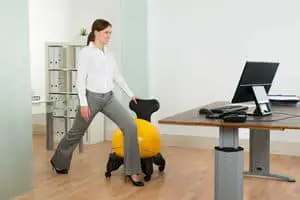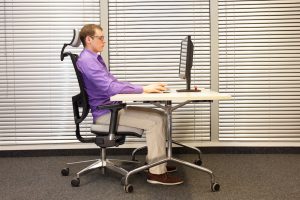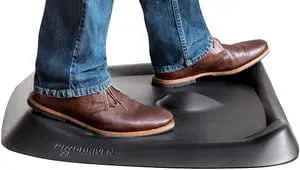Did you know that more than 18 million American adults have sleep apnea? According to the National Sleep Foundation, people with sleep apnea tend to be sleep deprived, resulting in a wide range of negative health symptoms. Because of this, many are exploring sleeping in a recliner to help sleep apnea.
Does sleeping in a recliner help with sleep apnea? Sleeping in a recliner may help with treating obstructive sleep apnea syndrome. A clinical study done by Springer suggested that sleeping with an elevated head at a 7.5-degree angle was able to reduce the severity of sleep apnea by 30 percent. This worked best for people with mild to moderate OSA.
With that said, there are many considerations in this particular topic that can be explored. In this post, we will take a closer look at the possibilities of sleeping in a recliner for sleep apnea. But before we do, it’s a good idea to understand what sleep apnea is and what causes it.
All content and media on Office Solution Pro are created and published online for informational purposes only. It is not intended as a substitute for professional medical advice and should not be relied on as health or personal advice. This post may contain affiliate links.
What is Sleep Apnea?
Sleep apnea is a serious sleep disorder that happens when a person’s breathing is interrupted during sleep. The word ‘apnea’ in sleep apnea refers to a breathing pause that lasts at least ten seconds. If you snore loudly and feel tired even after a full night’s sleep, you might have sleep apnea.

According to WebMD, there are two types of sleep apnea:
- Obstructive sleep apnea (OSA) – happens when the muscles in the back of the throat fail to keep the airway open, despite efforts to breathe. It is the more common form of sleep apnea.
- Central sleep apnea – happens when your brain doesn’t send proper signals to the muscles that control breathing. Unlike OSA, the airway is not blocked.
One of the most common symptoms of sleep apnea is chronic snoring. Because people who suffer from sleep apnea tend to be sleep deprived, they may experience sleeplessness, and excessive daytime sleepiness (hypersomnia). In more extreme cases, they might fall asleep while doing daily activities.
What aggravates sleep apnea?
So, what can aggravate sleep apnea? Drinking alcohol and smoking can aggravate sleep apnea. Both alcohol and cigarettes can worsen the swelling in the upper throat airway, making the apnea and snoring worse. Sleeping on your back may also aggravate sleep apnea as well.
Can you die in your sleep from sleep apnea?
So, can you die in your sleep from sleep apnea? Yes, you can die in your sleep from sleep apnea resulting in a sudden cardiac death. Sleep apnea is closely linked to several life-threatening conditions. One notable case is the death of Carrie Fisher caused by obstructive sleep apnea.
Nonetheless, sleep apnea is a treatable condition. If you suspect you may have sleep apnea, the first thing to do is to consult with your doctor. One of the most common methods used to diagnose sleep apnea is a sleep study, which may require an overnight stay at a sleep center.
The number one choice for treating obstructive sleep apnea is by using a Continuous Positive Airway Pressure device, or CPAP for short. This method of treatment is highly effective. Using the CPAP as recommended by your doctor or sleep specialist is very important.
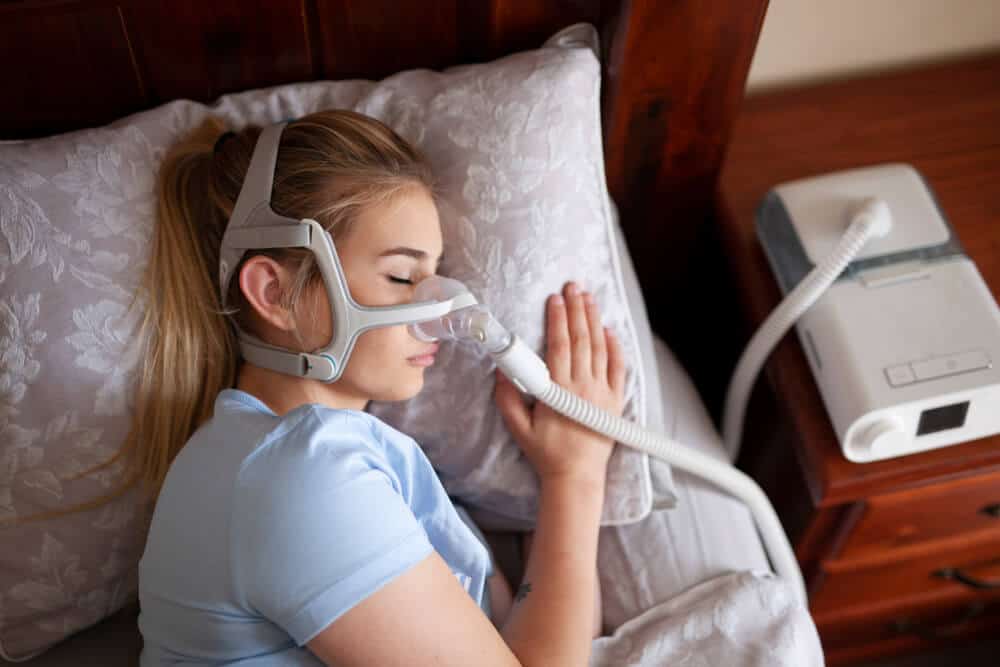
The number one choice for treating obstructive sleep apnea is Continuous Positive Airway Pressure (CPAP). This method of treatment is highly effective.
Does Sleeping in a Recliner Help with Sleep Apnea?
Before we dive deeper into sleeping in a recliner to help sleep apnea, we want to note that there is no substitute for CPAP when it comes to treating sleep apnea. The best thing you can do, if you feel like you suffer from it, is to go to your doctor or sleep specialist to get proper treatment.
However, there may be challenges in tolerating CPAP. Even with various CPAP setups, many people still find CPAP uncomfortable and give up within the first year. Luckily, there are a handful of other treatment options that might offer relief, including sleeping in a recliner properly.
Sleeping in a recliner for sleep apnea
There are two clinical studies that we want to highlight regarding sleeping in a recliner for sleep apnea. The first is a small clinical study with 13 male patients suffering from sleep apnea. These patients were relatively overweight. Interestingly, the sleep apnea symptoms disappeared in half the patients whenever they slept at a 60-degree angle.
The second clinical study involved 52 middle-aged males and females who were overweight. Instead of an uncomfortable 60-degree angle, the researchers had the patients sleep at an elevated head position of 7.5 degrees. This simple setup reduced the severity of sleep apnea by 30 percent.
Based on these two clinical studies, sleeping in a recliner at the right angle can help improve your sleep, especially for people with mild to moderate obstructive sleep apnea.
Sleeping in a fully reclined position can help better circulation, among many other benefits.
What is the best position to sleep if you have sleep apnea?
The best position to sleep if you have sleep apnea is to sleep on your side. This will prevent the muscles in the throat from relaxing during sleep, causing the airway to collapse and interrupt breathing. However, if you can’t sleep on your side, you can try sleeping in a recliner by slightly elevating your head.
A recliner is perfect for solving your sleeping difficulty because it provides excellent adjustability compared to a regular bed. In a fully reclined position, you can choose to sleep on your side or on your back (with a slightly elevated head). Think of it as having a super comfy and personal adjustable bed.
PRO TIP: If you want to try using a recliner to sleep better, we highly recommend checking out our review of the best recliners for sleeping at home. With so many brands out there, it’s hard to not only choose a high-quality chair from a reputable manufacturer but to find one that is built to support you properly.
Final Verdict
And there you have it, a short and simple post to answer does sleeping in a recliner help with sleep apnea? Again, we can never overstate the importance of seeing your doctor to get a proper diagnosis and treatment if you feel like you suffer from sleep apnea. Chances are, CPAP will get the job done for you.
However, if you find it difficult to cope with sleeping with it, you can try sleeping in a recliner to find better comfort. Due to the adjustable nature of a recliner chair, who knows, you might be able to find the perfect position to get a good night’s sleep.
As Dr. Foldvary said:
“Sleep is as important to good health as diet and exercise. We need sleep to restore every cell in our bodies. If we neglect it, some aspect of our health will suffer.”

